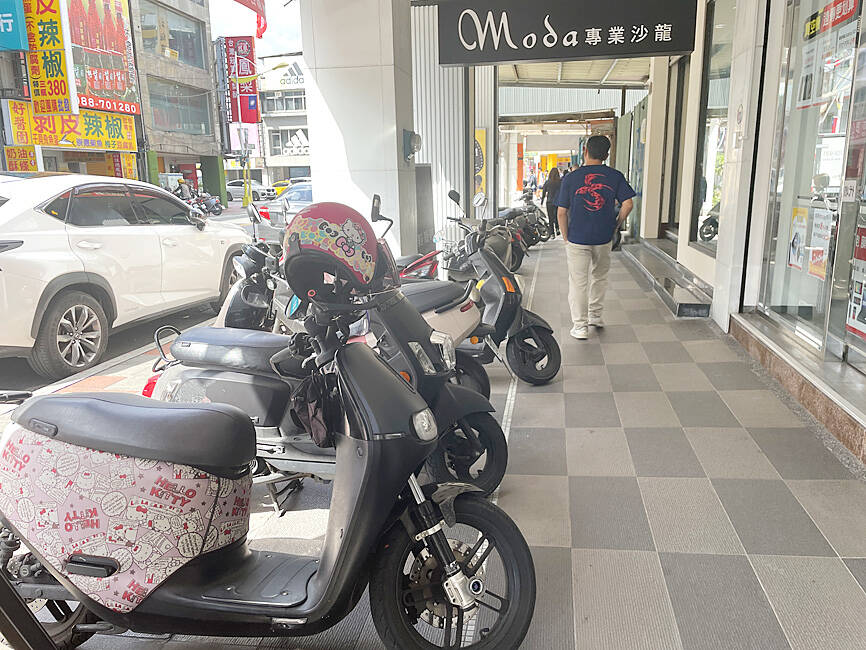The Executive Yuan yesterday approved amendments to the Road Traffic Management and Penalty Act (道路交通管理處罰條例) and a series of supporting measures, stipulating that drivers who commit “minor traffic violations” listed in the act would not receive demerit points and people would not be able to receive cash rewards for reporting minor violations.
Minor traffic violations refer to offenses that incur a fine of NT$1,200 or less.
They include not wearing a helmet when riding a motorcycle; talking on a mobile device while riding a motorcycle; smoking while riding a motorcycle or driving; and not heeding pedestrians when reversing.

Photo: CNA
Others are not having a guide when reversing large vehicles; stopping large vehicles on bridges, sidewalks, fast lanes, pedestrian crossings or in tunnels; and parking vehicles at intersections, within 10m of a public bus stop or 5m from a fire hydrant.
Other minor offenses include double-parking or parking against the flow of traffic; parking on bridges, sidewalks, pedestrian crossings, at crossroads, in tunnels, within 10m of public bus stops or within 5m of the entrance of a fire station; parking at entrances to airports, railway stations, ports, schools, entertainment venues, exhibition centers, stadiums, markets or in front of fire hydrants; and parking in spaces designated for use by disabled people.
The amendments were proposed to appease anger after the government on June 30 last year introduced a demerit points system to punish people who repeatedly commit traffic violations, the Ministry of Transportation and Communications said.
While the system has helped to reduce deaths from traffic accidents, reports of illegal parking surged, while demerit points were being given out at a great rate, the ministry said.
As people who accumulate 12 points in a 12-month period face suspension of their license for two months, some professional drivers complained that the system had affected their right to work, it said.
The system had also increased the workload for law enforcement personnel, as some regions do not yet have adequate parking spaces, making it more likely that drivers would contravene traffic regulations, it said.
Drivers who commit traffic offenses would still receive demerit points if they are stopped by law enforcement personnel, but they would not receive points if the offenses were reported by members of the public or captured by surveillance cameras, the ministry said, adding that drivers must still have points expunged by attending a defensive driving course.
The Executive Yuan also passed a draft pedestrian safety facility bill, which would require traffic authorities to move telecom boxes, mail boxes or fire hydrants if they impede traffic or pedestrians.
The owners of items that impede traffic would face fines of up to NT$150,000 for failing to address the issue within a designated period, the bill says.
People who modify or create obstacles on covered walkways or sidewalks without permissions would face a fine of up to NT$25,000, it says.

Conflict with Taiwan could leave China with “massive economic disruption, catastrophic military losses, significant social unrest, and devastating sanctions,” a US think tank said in a report released on Monday. The German Marshall Fund released a report titled If China Attacks Taiwan: The Consequences for China of “Minor Conflict” and “Major War” Scenarios. The report details the “massive” economic, military, social and international costs to China in the event of a minor conflict or major war with Taiwan, estimating that the Chinese People’s Liberation Army (PLA) could sustain losses of more than half of its active-duty ground forces, including 100,000 troops. Understanding Chinese

The Ministry of Foreign Affairs (MOFA) yesterday said it is closely monitoring developments in Venezuela, and would continue to cooperate with democratic allies and work together for regional and global security, stability, and prosperity. The remarks came after the US on Saturday launched a series of airstrikes in Venezuela and kidnapped Venezuelan President Nicolas Maduro, who was later flown to New York along with his wife. The pair face US charges related to drug trafficking and alleged cooperation with gangs designated as terrorist organizations. Maduro has denied the allegations. The ministry said that it is closely monitoring the political and economic situation

UNRELENTING: China attempted cyberattacks on Taiwan’s critical infrastructure 2.63 million times per day last year, up from 1.23 million in 2023, the NSB said China’s cyberarmy has long engaged in cyberattacks against Taiwan’s critical infrastructure, employing diverse and evolving tactics, the National Security Bureau (NSB) said yesterday, adding that cyberattacks on critical energy infrastructure last year increased 10-fold compared with the previous year. The NSB yesterday released a report titled Analysis on China’s Cyber Threats to Taiwan’s Critical Infrastructure in 2025, outlining the number of cyberattacks, major tactics and hacker groups. Taiwan’s national intelligence community identified a large number of cybersecurity incidents last year, the bureau said in a statement. China’s cyberarmy last year launched an average of 2.63 million intrusion attempts per day targeting Taiwan’s critical

‘SLICING METHOD’: In the event of a blockade, the China Coast Guard would intercept Taiwanese ships while its navy would seek to deter foreign intervention China’s military drills around Taiwan this week signaled potential strategies to cut the nation off from energy supplies and foreign military assistance, a US think tank report said. The Chinese People’s Liberation Army (PLA) conducted what it called “Justice Mission 2025” exercises from Monday to Tuesday in five maritime zones and airspace around Taiwan, calling them a warning to “Taiwanese independence” forces. In a report released on Wednesday, the Institute for the Study of War said the exercises effectively simulated blocking shipping routes to major port cities, including Kaohsiung, Keelung and Hualien. Taiwan would be highly vulnerable under such a blockade, because it